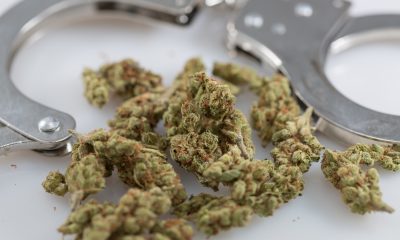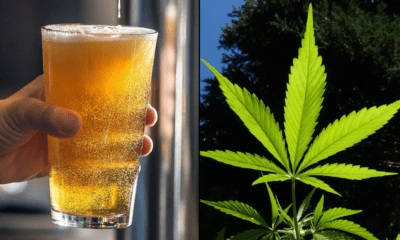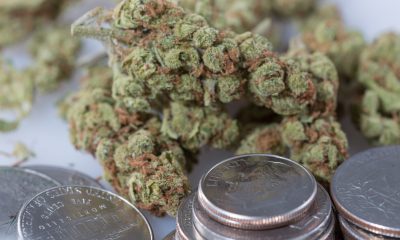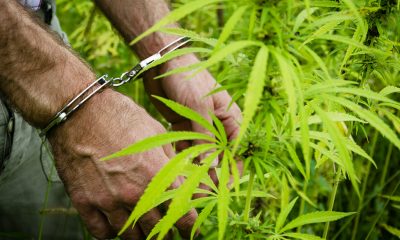Politics
Maryland Lawmakers Approve Millions In Funding To Implement Marijuana Legalization If Reform Is Enacted
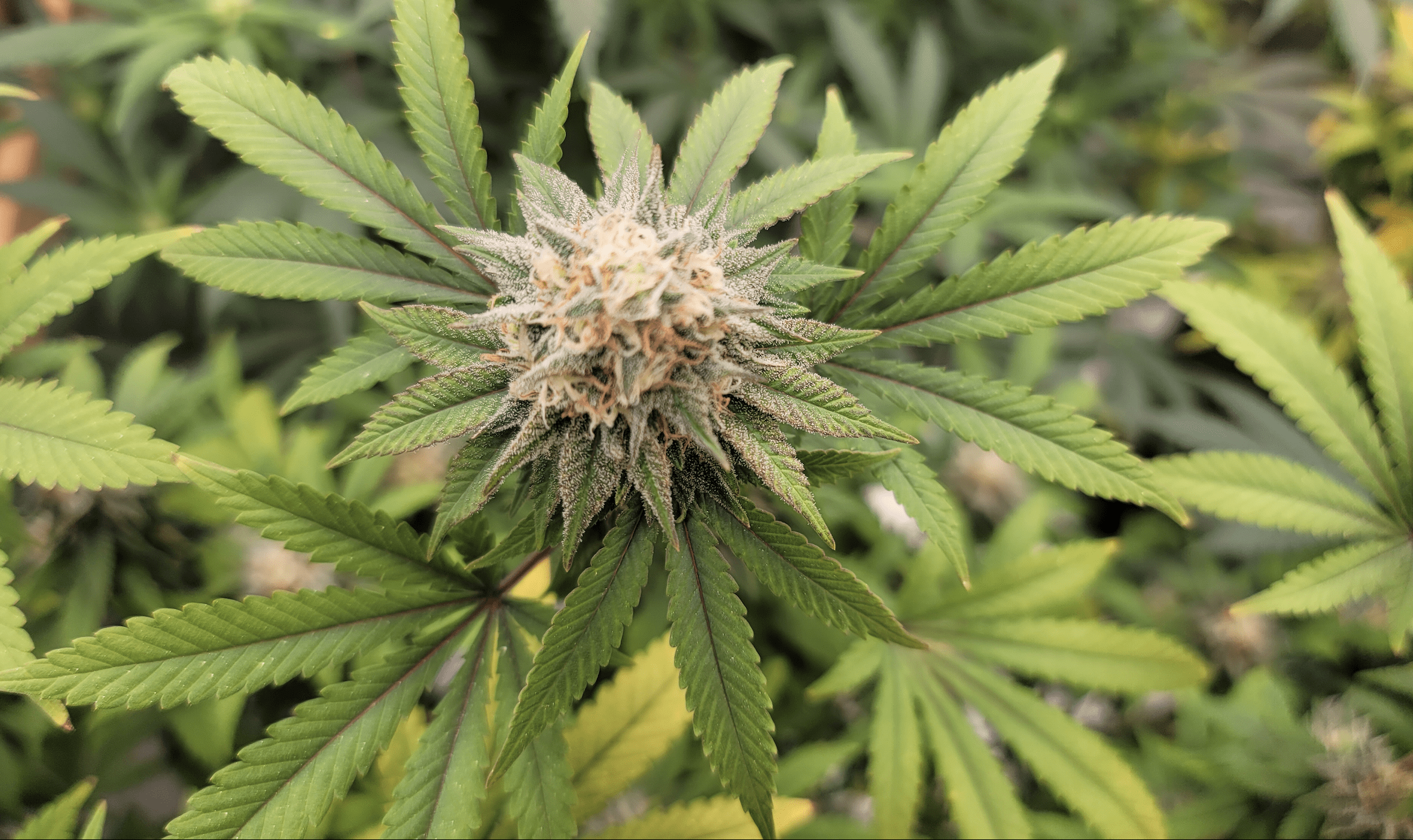
A key Maryland House committee advanced a Senate-approved budget bill last week, adding new amendments that would allocate tens of millions of dollars in funding to implement marijuana legalization with the expectation that the reform will ultimately be enacted this year.
The House Appropriations Committee cleared the amended legislation on Friday. It would provide about $52 million to support the implementation of cannabis legalization, facilitate expungements for prior cannabis convictions and fund a “disparity study” to “better understand the barriers to entering the cannabis market.”
This comes one month after the full House of Delegates separately passed bills to put marijuana legalization on the state’s 2022 ballot and set initial rules if voters approve the reform in November. All of the funding that the Appropriations Committee proposed setting aside for cannabis reform implementation is contingent on the enactment of the latter bill, HB 837.
Del. Luke Clippinger (D) is sponsoring both measures and said last month that lawmakers are “at the beginning of an important process.” His bills are scheduled for a Senate Finance Committee hearing on Wednesday.
Here’s a breakdown of the proposed cannabis funding as approved on Friday, which to be enacted would need to be adopted by the full House of Delegates and then agreed to in conference with the Senate, which did not include marijuana funding in the budget proposal it passed:
$40,000,000 to program T00F00.04 Office of Business Development for the Cannabis Business Assistance Fund, contingent on the enactment of HB 837 establishing the fund and the ratification of a constitutional amendment authorizing adult use and possession of cannabis.
$5,000,000 to program M00F03.04 Family Health and Chronic Disease Services for the Cannabis Public Health Fund, contingent on the enactment of HB 837 establishing the fund and the ratification of a constitutional amendment authorizing adult use and possession of cannabis.
$1,500,000 to program Q00A01.02 Information Technology and Communications Division, contingent upon enactment of HB 837 and the ratification of a constitutional amendment authorizing adult use and possession of cannabis, to fund Criminal Justice Information System enhancements necessary to comply with changes to statutory expungement provisions.
The House panel further approved additional marijuana-related implementation funding in another section of the proposed budget amendments dealing with the state judiciary.
That includes $3 million in general funds “for the District Court to provide resources for the expedient implementation of statutory changes to expungement laws resulting from the enactment of HB 837… The Judiciary is hereby authorized to redistribute funds to other programs as needed to implement HB 837.”
Another $2.5 million would go to the Maryland Legal Services Corporation “to provide resources to help MLSC educate individuals on changes to cannabis and expungement laws and support other expungement efforts.”
Finally, $250,000 would be earmarked for the Department of Legislative Services to carry out a “disparity study” on barriers to entry for the legal cannabis market if HB 837 is enacted and voters approve the legalization initiative at the ballot, per the referendum legislation, HB 1.
Clippinger’s HB 837 is meant to complement the ballot proposal, and it specifies that the purchase and possession of up to 1.5 ounces of cannabis would be legal for adults. It would remove criminal penalties for possession of up to 2.5 ounces. And adults 21 and older would be allowed to grow up to two plants for personal use and gift cannabis without remuneration.
Past convictions for conduct made legal under the proposed law would be automatically expunged, and people currently serving time for such offenses would be eligible for resentencing. The legislation makes it so people with convictions for possession with intent to distribute can now petition the courts for expungement three years after serving out their time.
—
Marijuana Moment is already tracking more than 1,000 cannabis, psychedelics and drug policy bills in state legislatures and Congress this year. Patreon supporters pledging at least $25/month get access to our interactive maps, charts and hearing calendar so they don’t miss any developments.
![]()
Learn more about our marijuana bill tracker and become a supporter on Patreon to get access.
—
Clippinger is the chairman of the House Judiciary Committee, which reported the bills out favorably last month. He also led a marijuana workgroup that House Speaker Adrienne Jones (D) formed last summer to study the issue.
HB 837 would further establish a Cannabis Business Assistance Fund to support equity initiatives for minority- and women-owned businesses. That fund would go toward incubator and educational programs to promote participation in the industry by people most impacted by criminalization.
To understand the effects of legalization on the state and its residents, the statutory bill would also establish various research initiatives, including studies into youth impacts, use patterns, impaired driving, advertising, labeling, quality control of products and barriers to entering the industry. A baseline study would be conducted before legalization, and updates would be sent to the governor every two months.
If voters approve legalization in November, it wouldn’t take effect immediately. Possession of small amounts of cannabis would become a civil offense on January 1, 2023, punishable by a $100 fine for up to 1.5 ounces, or $250 for more than 1.5 ounces and up to 2.5 ounces. Legalization for up to 1.5 ounces wouldn’t kick in for another six months.
Advocates have taken issue with that drawn-out timeline.
Clippinger and other lawmakers have indicated that they want to tackle comprehensive regulations for an adult-use marijuana market next year after voters weigh in on the issue at the ballot.
During last month’s initial floor consideration of the bills on second reading, the House minority leader and other GOP members attempted to attach several amendments to the proposals to make them more restrictive. All amendments—including one that would have allowed local governments to opt out of legalization and continue to criminalize people over cannabis—were soundly defeated.
Meanwhile, there are at least three other competing legalization bills that have been filed in the state legislature this session.
On the Senate side, meanwhile, Sen. Brian J. Feldman (D) last month introduced SB 833, which would also ask voters to approve a constitutional amendment legalizing cannabis for adults. That measure, like Clippinger’s plan, would go to voters in November and take effect in July 2023.
Feldman’s 83-page bill would allow home cultivation of up to four plants per adult, with a maximum of eight plants per residence. It would also package the constitutional amendment and basic regulatory framework in a single piece of legislation, unlike Clippinger’s bifurcated package.
Feldman was a lead author on a separate legalization measure last year that was co-sponsored by Senate President Bill Ferguson (D).
Ferguson, for his part, said last year that he favored legalizing cannabis through the legislature rather than waiting to ask voters on November’s ballot. This month, however, he expressed openness to the referendum idea, but stressed that voters deserve to know more details of what a legal cannabis market would look like than is provided in the House bills.
Another Senate bill in play this session, SB 692, from Sen. Jill Carter (D), would set higher possession amounts of up to four ounces of marijuana and would allow home cultivation of up to six cannabis plants. Possession in excess of those limits would carry no more than a $150 fine, and past criminal records would be cleared for certain cannabis-related charges.
Both Senate bills were discussed earlier this month in the Senate Finance Committee.
A competing legalization bill on the House side, HB 1342, was introduced last month by Del. Gabriel Acevero (D). It had a brief committee hearing on March 8.
More than two dozen advocacy groups—including ACLU of Maryland, NAACP Maryland State Conference, League of Women Voters of Maryland and Maryland Office of the Public Defender—sent a letter to Maryland legislative leaders last week demanding that racial and socioeconomic equity be placed at the forefront of any attempts to legalize marijuana in the state.
A recently released poll of Maryland voters from ACLU found that 66 percent are more likely to support marijuana legalization if it includes relief for past convictions; 65 percent are more likely to back it if the reform stops police from using the odor of cannabis as probable cause for a search and 61 percent are more likely to be on board with legislation if marijuana can’t be used to deny housing or child custody or negatively impact parole or probation status.
Maryland lawmakers are also considering separate legislation this year to decriminalize drug possession and fund access to psychedelics for therapeutic uses.
When it comes to marijuana, legalization began to advance through Maryland’s legislature last session, but no votes were ultimately held. The Senate Finance Committee held a hearing last March on a legalization bill sponsored by Feldman and Ferguson. That followed a House Judiciary Committee hearing on a separate cannabis proposal in February.
Lawmakers then worked to reconcile the differences between the House and Senate proposals in hopes of getting something to the desk of Gov. Larry Hogan (R). Hogan has not endorsed legalization but has signaled he may be open to considering the idea.
A poll in October found that the state’s residents are on board with the policy change. Two-thirds (67 percent) of Marylanders now back legalizing cannabis, according to a Goucher College survey. Just 28 percent are opposed.
Maryland legalized medical marijuana through an act of the legislature in 2012. Two years later, a decriminalization law took effect that replaced criminal penalties for possession of less than 10 grams with a civil fine of $100 to $500. Since then, however, a number of efforts to further marijuana reform have fallen short.
A bill to expand the decriminalization possession threshold to an ounce passed the House in 2020 but was never taken up in the Senate.
Also that year, the governor vetoed a bill that would have shielded people with low-level cannabis convictions from having their records publicized on a state database. In a veto statement, he said it was because lawmakers failed to pass a separate, non-cannabis measure aimed at addressing violent crime.
In 2017, Hogan declined to respond to a question about whether voters should be able to decide the issue, but by mid-2018 he had signed a bill to expand the state’s medical marijuana system and said full legalization was worth considering: “At this point, I think it’s worth taking a look at,” he said at the time.
As for Maryland lawmakers, a House committee in 2019 held hearings on two bills that would have legalized marijuana. While those proposals didn’t pass, they encouraged many hesitant lawmakers to begin seriously considering the change.
Maryland isn’t the only state gearing up for drug policy reform through the budget process.
For example, New York legislative leaders recently filed budget proposals that include language to let marijuana businesses take state tax deductions that are available to other industries despite an ongoing federal ban.
In January, the governor of Minnesota included funding to implement marijuana legalization in his annual budget request to lawmakers—a move that comes as Democratic legislative leaders prepare to advance the reform again this session even as it has stalled in the GOP-controlled Senate.
Relatedly, the Washington State legislature sent a budget bill to the governor’s desk this month that includes a proposal to direct $200,000 in funding to support a new workgroup to study the possibility of legalizing psilocybin services in the state, including the idea of using current marijuana regulatory systems to track psychedelic mushrooms.
Photo courtesy of Mike Latimer.




